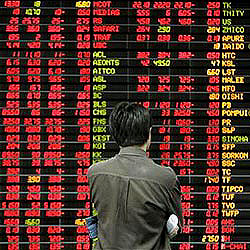If you’re a big bank, how do you make money? Consumer deposits? That was great back in the 50s, not so great now. Stock broking? It was a money machine until 1975, now it’s for chumps. Bond underwriting? Bor-r-r-r-ing.
Basically, anything that’s liquid and transparent and openly traded is hard to make a buck on. What you need are things that are opaque and hard for customers to understand. That’s why, for example, credit cards with lots of hidden charges are more profitable than credit cards that just assess a simple annual fee. And it’s why over-the-counter credit derivatives became so lucrative in the aughts. Each one is custom made, their structure is rocket science complicated, and instead of being traded on an exchange they’re bought and sold  directly by dealer-banks that can charge fat fees because it’s next to impossible for customers to know if they’re being fleeced or not. And because OTC credit derivatives tend to be very large securities, it makes sense for people to want to deal only with very large banks that are likely to make good in case of a big payout. Bob Litan of Brookings explains how this evolved into an oligopoly which is going to be very resistant to reform:
directly by dealer-banks that can charge fat fees because it’s next to impossible for customers to know if they’re being fleeced or not. And because OTC credit derivatives tend to be very large securities, it makes sense for people to want to deal only with very large banks that are likely to make good in case of a big payout. Bob Litan of Brookings explains how this evolved into an oligopoly which is going to be very resistant to reform:
There are parties with a significant presence in derivatives markets — indeed, some would say a dominant presence — for whom central clearing, and certainly exchange trading and greater price transparency, is not in their economic interest. Here, of course, I refer to the major derivatives dealers — the top 5 dealer-banks that control virtually all of the dealer-to-dealer trades in CDS.
….Market-makers make the most profit, however, as long as they can operate as much in the dark as is possible — so that customers don’t know the true going prices, only the dealers do. This opacity allows the dealers to keep spreads high….Central clearing and other steps to which it could and should lead — exchange trading and greater price transparency — would threaten these revenues, potentially in a big way, for several reasons.
[Reasons given, and potential outcomes listed.]
….All of these outcomes are good for investors, the buy-side and end-users of derivatives, but not necessarily for dealers as a group if the buy-side and end-users are able to directly access exchanges and clearinghouses….It is understandable, of course, why the main dealer-banks would not want such a world to come about, and thus individually each of them has reasons to slow or resist change, their commitments to clear virtually all new “eligible” derivatives notwithstanding. For reasons spelled out earlier, those commitments fall far short of the kind of cleared, exchange traded, and transparent environment that would be in the best interest of the financial system and the economy as a whole.
Long story short, Litan basically says that even if we pass regulatory reform, the dealer-banks that currently control the market in OTC derivatives have a ton of incentive to slow-walk anything that creates genuine transparency. This all comes via Mike Konczal, who adds this:
If you thought we’d at least get our arms around credit default swap reform from a financial reform bill, you should read this report from Litan as a giant warning flag. In case you weren’t sure if you’ve heard anyone directly lay out the case on how the market and political concentration in the United States banking sector hurts consumers and increases systemic risk through both political pressures and anticompetitive levels of control of the institutions of the market, now you have. It’s not Matt Taibbi, but it’s much further away from a “everything is actually fine and the Treasury is in control of reform” reassurance. Which should scare you, and give you yet another good reason for size caps for the major banks.
Mike suggests that this is a good reason to take more seriously the idea of breaking up big banks: if there were 20 or 30 dealer-banks instead of five, they just wouldn’t have the same power to set prices and maintain opacity in the OTC derivatives market. True enough. At the same time, it’s also a good argument for passing blunt reforms. Nothing is perfect, but blunt rules about equity trading have worked well for decades even though there are loads of incentives to game the system. OTC derivatives obviously can’t be standardized to the same degree, but blunt rules could still take us a long way in that direction.













